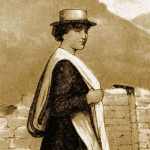Oh, dear!
The Christian virtues will disappear!
Nowhere on land or sea
Will be room for charity!
Nowhere, in field or city,
A person to help or pity!
Better for them, no doubt,
Not to need helping out
Of their old miry ditch.
But, alas for us, the rich!
For we shall lose, you see,
Our boasted charity!—
Lose all the pride and joy
Of giving the poor employ,
(And making stock thereof!).
Our Christian virtues are gone,
With nothing to practise on!
It don’t hurt them a bit,
For they can’t practise it;
But it’s our great joy and pride—
What virtue have we beside?
We believe, as sure as we live,
That it is more blessed to give
Than to want, and waste, and grieve,
And occasionally receive!
And here are the people pressing
To rob us of our pet blessing!
No chance to endow or bedizen
A hospital, school or prison,
And leave our own proud name
To Gratitude and Fame!
No chance to do one good deed,
To give what we do not need,
To leave what we cannot use
To those whom we deign to choose!
When none want broken meat,
How shall our cake be sweet?
When none want flannels and coals,
How shall we save our souls?
Oh, dear! Oh, dear!
The Christian virtues will disappear!
The poor have their virtues rude,—
Meekness and gratitude,
Endurance, and respect
For us, the world’s elect;
Economy, self-denial,
Patience in every trial,
Self-sacrifice, self-restraint,—
Virtues enough for a saint!
Virtues enough to bear
All this life’s sorrow and care!
Virtues by which to rise
To a front seat in the skies!
How can they turn from this
To common earthly bliss,—
Mere clothes, and food, and drink,
And leisure to read and think,
And art, and beauty, and ease,—
There is no crown for these!
True, if their gratitude
Were not for fire and food,
They might still learn to bless
The Lord for their happiness!
And, instead of respect for wealth,
Might learn from beauty, and health,
Each man to respect himself!
And, instead of scraping and saving,
Might learn from using and having
That man’s life should be spent
In a grand development!
But this is petty and small;
These are not virtues at all;
They do not look as they should;
They don’t do us any good!
Oh, dear! Oh, dear! Oh, dear!
The Christian virtues will disappear!





















Comment form: